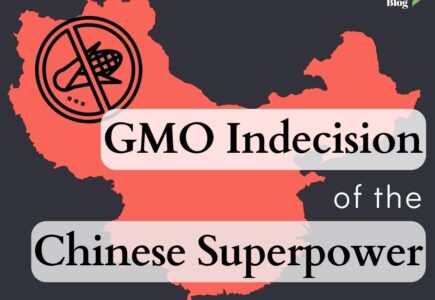China is a superpower. In 2021, China accounted for 18% of the world’s population and had the second largest GDP with USD 17.73 trillion. Since its ‘78 “Reform and Open-door Policy”, China has shifted from rural and local markets to a booming economy of urbanization, technology, and global trade and investment. Today they are the leaders in manufacturing, technology, and sciences. As a strong nation with global trade power, an ever-growing economy, and a growing middle class, China has a great influence over the rest of the world. If China sneezes, it is felt worldwide. China, especially, is a powerhouse of sciences and consumables. If China says no to genetically modified (GM) crops, those exporting crops to China need to adjust.
So where does China stand in the world of biotech and crops?
It is an interesting story when it comes to biotechnology and particularly the acceptance of GM crops in China . As one of the first to grow GM crops, China has the willingness to accept the crops of food and feed, but not necessarily approve them for commercialization (production). So far, they have only approved 17 events for domestic production (commercialization), of which all but one were developed in China. So what is the real story behind China’s commercialization of GM crops? Why does a nation with >12% of the world’s arable land and nearly a fifth of the population not use GM crops to their full potential of production or profit?
To better understand why the superpower of a nation has failed to lead GM production and research, this week we are inspired by Dr’s Zhihua Xiao and William A. Kerr’s 2022 paper from Food and Energy Security on this very topic. Their political-economic paper analyzes secondary data from regulations and policy documents, reports from the past 40 years, publications on China’s GMOs, as well as survey data on scientists, farmers, and consumers, to explain the delay and conflict surrounding GM commercialization. We will not go into detail on Drs Xiao and Kerr’s paper as it would not likely do it justice. If you can, take the time to read their article as they dive into greater detail than what one blog can cover.
Instead, we will focus on China’s position of indecision and how it conflicts with their past decisions and interests. Dating back to the 80s, China was a leader in biotechnology research. Their government invested US$3.8 billion in China’s GM research and development from 2008 to 2020. While billions have been invested into China’s GM crops, they have made little progress to approve their own crops or see other nations (besides the USA) approve their crops. Yet we know they haven’t supported domestic commercialization. Why would a nation invest so heavily into an area of self-sufficing food and fail to implement it? It should be noted that they do heavily import GM crops, thereby creating this indecision and political dilemma over GM. In 2020, mainland China imported 6% of all maize traded- a whopping 11.29 million tons of GM maize– and according to the authors, China imported 60% of globally traded soybeans. This illustrates the disconnect between China’s decisions on GM crops and their use of them.
What is the rub of commercialization?
China’s GM commercialization of crops and their practices and policies are complex. As a growing population with changing food demands, a global push for ‘sustainable’ crops and agriculture, and the changing voice of consumer choices, the decision to implement GM crops is becoming more complex for China. Yet, the lack of decision to produce GM crops while importing GM crops seem like an odd one for China. Given China’s political system and power, as outsiders, we do not expect China to have such an indecisive choice over something that could be both profitable and beneficial to self-sufficient crop production.
It began with the lack of early transparency. In 2009 GM maize and Bt rice were the first crops to receive the Ministry of Agriculture (MOA) production safety certificate in China. While this could have been viewed as wildly successful, it was more or less hidden from the public and details of the health and environmental impacts went unannounced. It’s no surprise that this spurred distrust and conspiracy theories! It has since sparked debate across China and negative information on GM and human health risks circulated including the accusation of negative impacts on sperm count, animal abortions, and the kindergarten scandal. This scandal accused an MOA’s Kindergarten cafeteria of using non-GM cooking oil, thereby inferring that GM oil wasn’t safe enough to serve to the MOA’s children. While these safety concerns have no backing, politically and socially, it does not look good for a pro-GM government to not use GM oil.
The debate about GM is also stimulated by China’s history with food scandals, ‘conspiracy’ to buy off officials, and equality. Back in 2008, China suffered from the Milk Scandal. Sadly, milk powder had been adulterated with the toxic compound, melamine, in which at least 300,000 infants were exposed to the contaminant. This scandal had a lasting impact on the trust of Chinese and international consumers, and for good reason. There is also the conspiracy theory that officials and scientists can be bought off by GM multinationals to approve the safety and environmental impacts. While we hope this isn’t the case, it continues to stir the pot of doubt and debate.
Lastly, there is the issue of equality in China. While not the only nation with this issue, representing 18% of our world’s population, it’s easy to see the gaps in China’s society and question whether the general population is being given the same rights as those at the top. We should not necessarily be questioning or pointing fingers, but we do. What we see from our Western lens on China’s attempt to correct its course on GM crops is that the flow of information and perhaps lack of equality across consumers, farmers, scientists, and industry is creating more confusion. As a more controlled state than Canada and the United States in the area of communication, past incidences like the milk scandal have given consumers reason to doubt their science, policy, and GM foods. When Chinese consumers question GM crops, it makes farmers question whether they should want to produce GM crops. Why produce something locals won’t eat? The same is true for the industry. If your higher profit market is Europe and they don’t accept GM crops, does it make sense to keep backing this venture? Looking from the outside, commercialization of GM crops might not be necessary for China right now.
The catch
China’s government and scientists have invested heavily in the early commercialization of GM crops, yet failed to see a successful implementation of production across their nation. What is shocking about this is that while they have yet to get GM crops into production locally, they continue to import GM crops. We also know that with the growing population, economy, and push for environmental improvements, GM crops could be a great choice for China. So should we be encouraging China to make the move to commercialize GM crops? As mentioned before, China has a great influence over the rest of the world. Is their commercialization what we need to push the rest of the world to make the same adoption?
Perhaps China’s dilemma over GM commercialization is best for us right now. The issues of mistrust and concern over lack of transparency continue to harm their local acceptance of production, but is a win for us onlookers, who continue to produce GM crops that we export to China. The catch is that China is sitting on the potential of leading GM crop production and perhaps innovation, yet the culture they have created as a result of their policy, communications, and history has put their success on the back burner. Their indecision to move forward with GM commercialization has led their powerful government to take a cautious attitude, which is of great surprise and benefit to the Western producers of GM crops.




